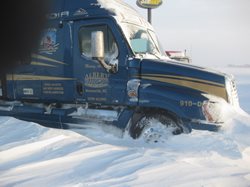 Severe weather caused big problems in January this year, driving down December tonnage by 4.3% - the greatest month-to-month decline in two years (as reported by American Trucking Association). Cold weather and lack of sun can be a dreary time for anyone, but as an owner-operator, the troubles that occur during this time of year can affect more than just your mood.
Severe weather caused big problems in January this year, driving down December tonnage by 4.3% - the greatest month-to-month decline in two years (as reported by American Trucking Association). Cold weather and lack of sun can be a dreary time for anyone, but as an owner-operator, the troubles that occur during this time of year can affect more than just your mood.
The fact that these storms have been coming one right after the other, as well as affecting a larger part of the country than usual, only add to the already long list of weather related issues. Higher truck idling times and high winds can lower MPG, and poor road conditions can not only increase risk of an accident, but also the likelihood that you won’t get enough miles each month.
So what can you do to help counteract these issues? Here are our eight tips to keep you ahead of winter storms:
- Communicate with your Driver Manager. Discuss concerns with them from the start. Work as a team to create a strategy that works best for you to obtain more miles to make up for a deficit.
- Always be prepared. Plan each trip to avoid winter storms if possible by checking forecasts and potential construction areas along your route. Chart out fuel, meal stop locations, and allow extra time for traffic delays. Click here for mobile apps available for download from The Weather Channel.
- Fill up on fuel. Fuel can thicken or gel in extreme cold temperatures, so remember that a full tank is less likely to have problems. You can limit (and sometimes eliminate) the amount of additives you have to use if you decide to purchase fuel farther North. Consult your engine manufacturer for additive guidelines.
- Play it smart and stop. If your gut is telling you to stop, pull over and stop. It’s better to play it safe than gamble with your safety. One carrier claimed that they would trade lower operations (and a little less revenue) for not having weather-related accidents anytime.
- Reduce your idling costs. Purchase an Auxiliary Power Unit (APU) to provide electricity and heat. Save your receipt to claim the APU expense on your tax return. Click here for a full list of Idle Reduction Equipment from the U.S. Department of Energy. Click here for tips on how to save fuel.
- Check your cargo. Icy roads and goods shifting in the trailer are not a good combination. If possible, monitor the shipper’s loading procedures to ensure weight has been evenly distributed within the trailer.
- Perform a thorough pre- AND post-trip inspection. Be diligent with inspecting everything visually and hands-on. Listen carefully for air leaks, because small leaks can become big leaks in extreme cold. Post-trip inspections can reveal problems that might be fixed while in the sleeper berth or off-duty.
- Prepare with emergency funds. Having a reserve savings account set aside just for these circumstances will take a lot of worry off your shoulders. Although bad weather can’t be controlled, you can take the right steps to prepare yourself before it hits where it hurts the most.
Above all, remember that your safety and the safety of others should be at the utmost importance. Indicators are showing that future month projections are looking good, even with the storms. We are hoping for better weather ahead in the upcoming months!